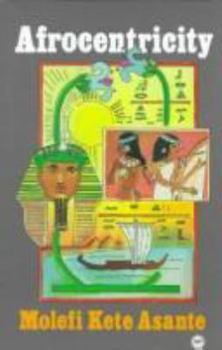Afrocentricity: The theory of Social Change
Select Format
Select Condition 
Book Overview
A groundbreaking effort, this book offers a philosophical inquiry into the future of the Afrocentric perspective.
Format:Paperback
Language:English
ISBN:0865430675
ISBN13:9780865430679
Release Date:January 1988
Publisher:Africa Research and Publications
Length:126 Pages
Weight:0.43 lbs.
Dimensions:0.4" x 5.5" x 8.5"
Customer Reviews
3 ratings
One of the great thinkers of the 20th Century
Published by Thriftbooks.com User , 23 years ago
Afrocentricity remains as one of the newest and least understood of philosophical branches. Originating in the late 19th Century through the work of W.E.B. DuBois and his contemporaries, Asante provides a brilliant stepping-stone, just scraping the surface for the uninitiated beginner, into this compelling branch of thought. Particularly interesting are his arguements on human nature and of universality. Afrocentricity is NOT Black nationalist propaganda, it is a legitimate point-of-view and a basis of serious scholarship. Essential reading for any philosophy student.
foundation
Published by Thriftbooks.com User , 25 years ago
A great starting point for the reader just beginning to read and form an opinion on this life science called Afrocentricity. This book is an easy read but direct in its approach.
Extremely necessary for educators in every field.
Published by Thriftbooks.com User , 25 years ago
Hotep to those who want to recognize truth and bring enlightenment to our future leaders.Dr. Molefi K. Asante has never been a favorite of anyone who wants African Americans to not gain victory over their plight in America(especially in the academy. As a teacher and a student, I've witnessed hundreds of students become more encouraged and realistic about their future and their history. Afrocentricty is not for the timid or the meek. It was written for those persons who recognize the atrocities of our educational system and realize African Americans must view themselves as competent, creative, sensitive, and humane people, who have contributed much to humankind. A white American scholar named Ulrich C.Reitzug (University of Wisconsin-Milwaukee)wrote a a chapter in Theodore Kowalski's Public Relations in Educational Organizations (1996), entitled Changing Social and Institutional Conditions, stating that: "Prior to becoming a university professor I worked in K-12 schools for eleven years as a teacher and principal. The schools in which I worked wre attended by primarily white students from upper middle class, two-parent families. Nonetheless, there was sufficient diversity in these schools that there were also children in attendance from economically disadvantaged families and single parent families. As I reflect back on those days I realize that while overall I was well respected as an educator, i also know that education in the schools in which I worked was like a cheap tube sock-one size fit all...I believed in euity and justice. I cared for my students and their families; I wanted a top quality education for all students. However, I viewed these concepts through the narrow lens of a white middle class male living in a period of time when white maleness so dominated education that our focus was seldom challenged. Thus I was insensitive to cultural differences in learning style; I was unaware of certain aspects of student diversity; i did not now enough to question the Eurocentric content of the textbooks we used. I thought equality of educational opportunity meant providing the best "white" education for all children. If nonwhite children or other children who were culturally different from the mainstream "didn't get it," we would team them in a group with other children who also "didn't get it." There we would help them by providing white education in finer, more discrete increments. I was never sensitive enough to realize that the Eurocentric focus of the education we provided delegitimized the culture of children of color and ensure inequalitiy of educational opportunity for most of these children. This educator references in his bibliography, Molefi Kete Asante's Afrocentricity, as a book used in his research. For those of us who grew up under a system of Jim Crow and segregation, and now the eradication of Affirmative Action (thanks to African Americans like Ward Connelly), it is






